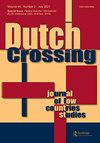Aicha Is More Dutch but Less Dynamic than Ahmed: The Gendered Nature of Race in the Netherlands
IF 0.4
3区 历史学
Q1 HISTORY
Dutch Crossing-Journal of Low Countries Studies
Pub Date : 2022-09-02
DOI:10.1080/03096564.2022.2145043
引用次数: 1
Abstract
ABSTRACT In this article we rely on accent evaluation to test the ‘intersectional invisibility hypothesis’ 1 that social cognition about men (but not women) is overrepresented in group-level beliefs. 2 As a case in point, we investigate the evaluation of male and female Moroccan accents to gain insight into impression formation of Muslims in the Netherlands, and to find out whether stereotypical qualities associated with Moroccan-Dutch people, such as aggressive, macho, and criminal, are in fact associated with Moroccan-Dutch men. Two matched-guise experiments featuring regional and ethnic accents of Dutch (one with male speakers, one with female speakers) confirm the intersectional invisibility hypothesis, but the inclusion of traditional and modern prestige measures in accent evaluation research results in arguably richer stereotype and prejudice accounts, and in this sense, the present investigation adds nuance and shade to Gloria Wekker’s (2016) pessimistic account of racism in Dutch society. Male Moroccan-Dutch speech is strongly deprecated and is always deemed inferior to indigenous speech; at the same time it is also found to be the most dynamically prestigious of all accents. Female Moroccan-Dutch speech does not engender extreme reactions, but it is not regarded as dynamic either and a long way from being accepted as indigenous speech.艾莎比艾哈迈德更像荷兰人,但没有活力:荷兰种族的性别本质
在本文中,我们依靠口音评估来测试“交叉隐形假设”1,即关于男性(而不是女性)的社会认知在群体层面的信念中被过度代表。作为一个恰当的例子,我们调查了对男性和女性摩洛哥口音的评价,以深入了解荷兰穆斯林的印象形成,并找出与摩洛哥-荷兰人相关的刻板印象是否与摩洛哥-荷兰人有关,例如侵略性,男子气概和犯罪行为,实际上与摩洛哥-荷兰人有关。两个以荷兰语的地区和民族口音为特征的匹配伪装实验(一个是男性说话者,一个是女性说话者)证实了交叉隐形假说,但在口音评估研究中纳入传统和现代声望测量的结果可以说是更丰富的刻板印象和偏见,从这个意义上说,本研究为Gloria Wekker(2016)对荷兰社会种族主义的悲观描述增添了细微差别和阴影。男性摩洛哥-荷兰语被强烈反对,并且总是被认为不如本土语言;同时,它也被认为是所有口音中最具活力和声望的。女性摩洛哥-荷兰语不会引起极端的反应,但也不被认为是动态的,距离被接受为本土语言还有很长的路要走。
本文章由计算机程序翻译,如有差异,请以英文原文为准。
求助全文
约1分钟内获得全文
求助全文

 求助内容:
求助内容: 应助结果提醒方式:
应助结果提醒方式:


